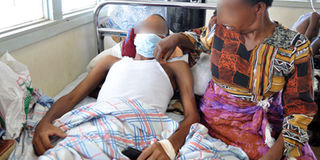What you need to know before taking care of a cancer patient

Caregiver. A relative attends to a cancer patient at the Uganda Cancer Institute in Mulago on January 31, 2014. PHOTO BY RACHEL MABALA
What you need to know:
- Creating awareness. Daily Monitor is this month running stories on cancer to empathise with those affected, celebrate with those who have beaten the scourge and also create awareness. Today, Edgar R. Batte shares tips on how one can take good care of a cancer patient.
“When people are sick, they need caretakers; their friends and relatives. It helps them get the support they need and to be comforted. So, it is very useful for those people to be there. Most of our hospitals and health facilities don’t have sufficient human resource for the nurses to do all the work that they are supposed to do. Attendants have a role to play,” Dr Moses Galukande, the director of surgery, education and research and head of clinical engagement at International Hospital Kampala (IHK), observes.
The surgeon adds that when one looks after a sick person for a long time, they can also get affected.
“You can get emotionally and psychologically depressed. It is what we call caregiver fatigue and distress. We forget that the carer sometimes needs attention but just know cancer is not contagious. The role carers play is critical for the healing process of a patient,” he says.
Dr Joseph Lubega, a paediatrician haematologist oncologist at the Baylor College of Medicine at Mulago National Referral Hospital, observes that when a child has cancer, the whole family is affected.
Huge impact
“The rest of the family might not have cancer but the disease has a huge impact on every member of the family. Often it means that one parent stops everything and dedicates their time and life to take care of a sick child. It often means that the family’s finances are drained as it provides care for the child. It also means that other siblings get less attention from their parents,” he explains.
He adds that as cancer experts, they understand such situation and have strategies and involve parents and caretakers as much as possible in the decision making processes to help them plan their lives and lives of their other children.
“From the perspective of parents or family participating in these children’s care, it is important, like in any other disease but more critical when it comes to cancer in children because the treatments are usually very intense; they are long ranging from a few months to many years so the family has to participate,” Dr Lubega further explains.
Nutrition is a key aspect in taking care of cancer patients since chemotherapy sometimes leads to loss of appetite as part of a range of feeding challenges.
“If the caretaker understands that whatever is happening to this patient is related to the medication, that motivates them to have some patience and understanding to better accommodate the needs of the patient,” Ms Jolly Kamugisha, a nutritionist at Mulago National Referral Hospital, explains.
Screening
She says it is important for patients be regularly screened for malnutrition. She cites cases of malnutrition developing in many patients as a result of cancer but also a result of nutrition due to feeding problems.
“Through screening, those that are malnourished will be identified. There is some protocol followed depending on the level. If it is moderate acute malnutrition, they will receive a diet that is high in energy, high in protein and micronutrients to meet their needs. Those that are severely malnourished undergo what we call therapeutic feeding,” she says.
For loss of appetite, Ms Kamugisha recommends small frequent meals and encourage and intake of fluid so that the patient is well hydrated. If they have a dry mouth, she still encourages caretakers to feed patients with fluids, adding that there should be water bottle nearby for a patient to pick at any time.
“Soup and gravies are good for those with mouth sores, as well as soft foods for example soft fibre foods. Overall, a caretaker needs to ensure that the meals they feed patients on have adequate calories, proteins and micronutrients,” the nutritionist adds.
Dr Dennis Buwembo, a public health specialist, says preparation to take care of a cancer patient depends on the type of cancer, treatment being received and stage of disease.
Holistic approach
“The needs are holistic involving the patient’s physical, psychological, social, financial, information, spiritual or religious issues, family relationships, emotional concerns, practical issues (employment, training, preparation of meals, etc.) or other everyday life issues,” he explains.
Dr Lubega says when it comes to taking care of children with cancer, a caretaker has to firstly recognise and appreciate that cancer is a very fatal disease.
He explains that caring for children with cancers not only calls for expert doctors but nurses, nutritionists, specialists in child psychology, who know what it means for a child to go through such difficult illness and therapies for their school and development.
Where to find help
UMC Victoria Hospital: Free breast cancer screening at the hospital and UMC Entebbe clinic, free specialist/ doctor consultation and discount on extra investigations such as ultra-sound /biopsy if required.
Nakasero Hospital: Breast cancer awareness presentation twice every week for October, free clinical breast examination following the presentation, free mammography services following the breast exam for those that require it and all the above will require booking to ensure good planning for each day.
AAR: All AAR clinics (Makerere Health Centre, Bweyogerere Health Centre, Bweyogerere Health Centre – annex, Kabalagala Health Centre, Bugolobi Health Centre, City Health Centre, Entebbe clinic, Ntinda Health Centre, Acacia Health Centre, Mukono Health Centre, Natete Health Centre and Gulu Health Centre) will provide free breast cancer examination and V/A screening at a subsidised price of Shs10,000.




